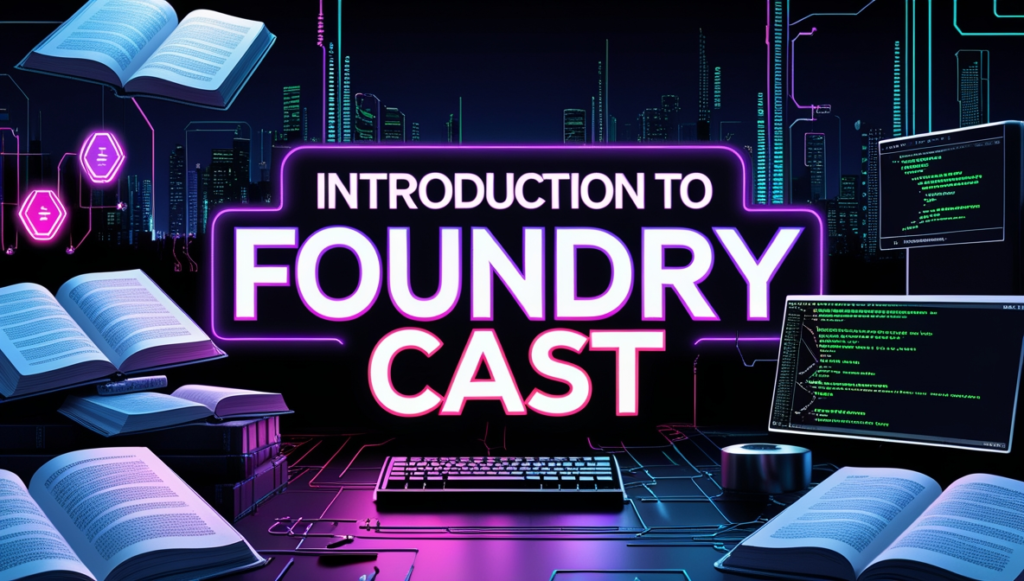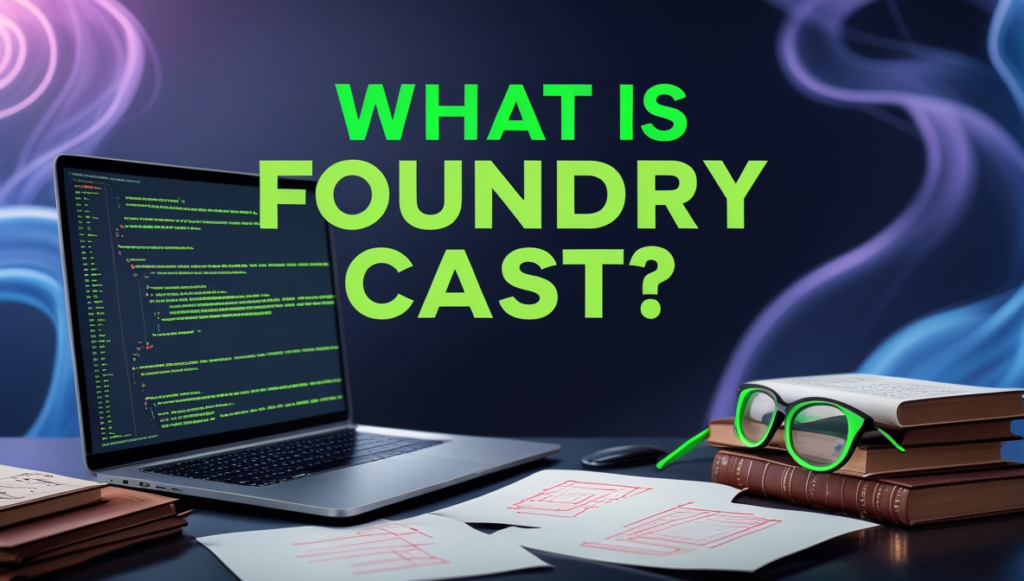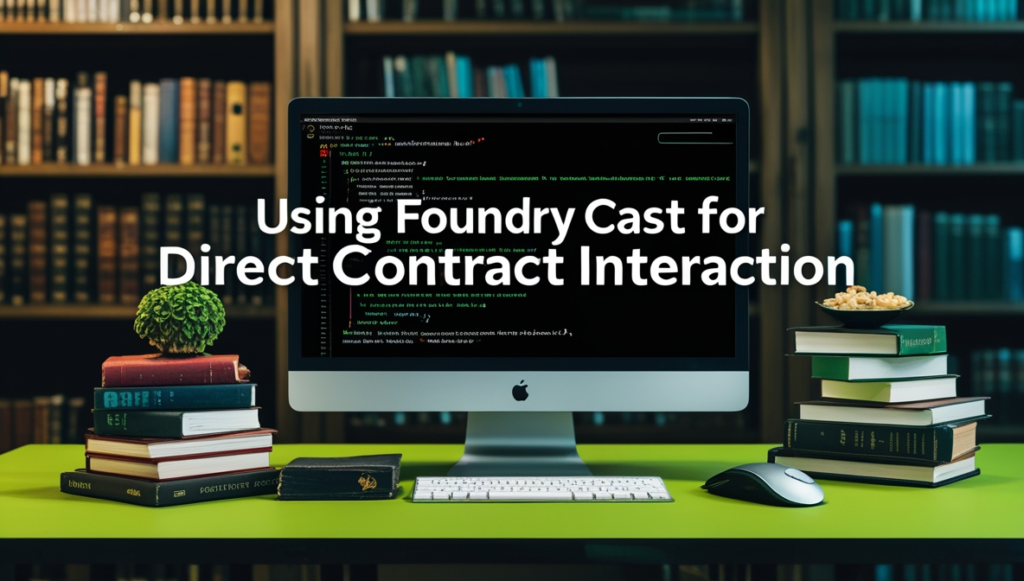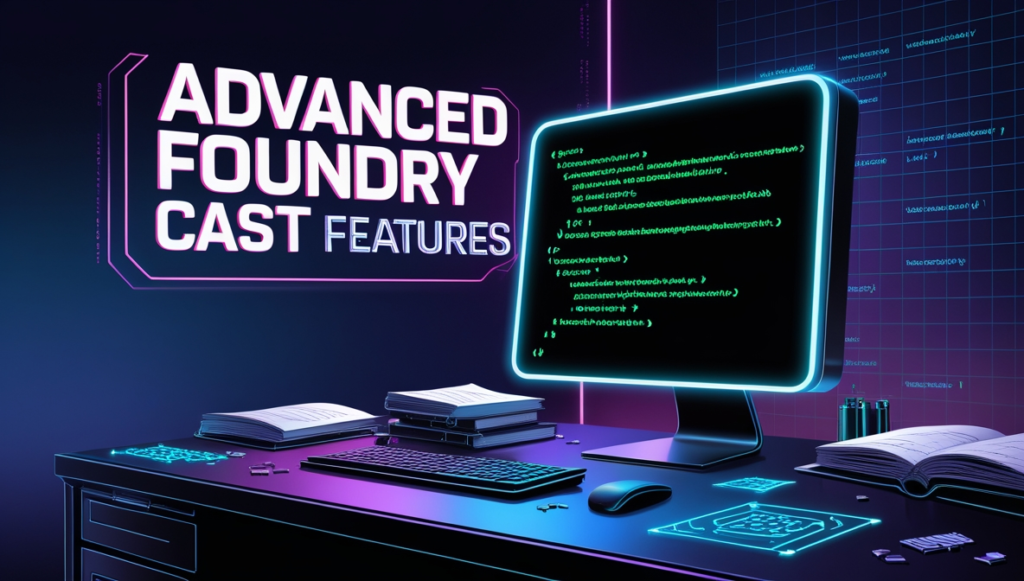Table of Contents
Introduction to Foundry Cast

Foundry Cast for Direct Contract Interaction : If you’re diving into smart contract development with Solidity, you’ve probably heard of Foundry. It’s a modern Ethereum development framework that makes testing, deploying, and interacting with smart contracts much easier. In this guide, we’ll explore Foundry Cast, a powerful command-line tool for direct contract interaction, including sending transactions, calling read/write functions, and using advanced testing features.
By the end of this article, you’ll understand how to:
- Use Foundry Cast to interact with smart contracts directly.
- Send transactions using
cast send. - Call smart contract functions using
cast call. - Utilize advanced Foundry testing features for Solidity.
This tutorial is designed for beginners, so don’t worry if you’re new to Foundry or Solidity. Let’s get started!
What is Foundry Cast?

Foundry Cast is a command-line tool that allows you to directly interact with Ethereum smart contracts. It simplifies executing read and write functions on smart contracts, making it a go-to tool for developers working with Solidity and Web3.
Why Use Foundry Cast?
- Direct contract interaction: Send transactions and call functions without writing scripts.
- Speed: Faster than using traditional libraries like Web3.js or Ethers.js.
- Gas estimation: Helps estimate the gas cost of transactions before execution.
- Integration with Foundry testing framework: Makes debugging and testing smart contracts seamless.
Installing Foundry Cast
Before using Foundry Cast, you need to install Foundry itself. Run the following command in your terminal:
curl -L https://foundry.paradigm.xyz | bash
foundryupOnce installed, verify that Cast is available by running:
cast --versionIf you see the version number, you’re good to go!
Using Foundry Cast for Direct Contract Interaction

1. Calling Read Functions (cast call)
A read function is a view or pure function in Solidity that does not modify the blockchain state. You can use cast call to fetch data from a smart contract.
Example: Getting the Token Balance of an Address
cast call 0xTokenAddress "balanceOf(address)" 0xYourAddress --rpc-url https://mainnet.infura.io/v3/YOUR_INFURA_KEY0xTokenAddress: The address of the token contract.balanceOf(address): The function to call.0xYourAddress: Your Ethereum address.--rpc-url: The Ethereum network RPC endpoint.
2. Sending Transactions (cast send)
A write function modifies the blockchain state, requiring gas fees. Use cast send to execute transactions on a smart contract.
Example: Sending Tokens
cast send 0xTokenAddress "transfer(address,uint256)" 0xRecipientAddress 1000000000000000000 --private-key YOUR_PRIVATE_KEY --rpc-url https://mainnet.infura.io/v3/YOUR_INFURA_KEY- This transfers
1 ETHworth of tokens (10^18units) to0xRecipientAddress. - Use a private key carefully (never expose it in public repositories!).
Advanced Foundry Cast Features

1. Using cast tx to Inspect Transactions
To get detailed information about a past transaction, use:
cast tx 0xTransactionHash --rpc-url https://mainnet.infura.io/v3/YOUR_INFURA_KEYThis returns:
- Gas used
- Input data
- Logs emitted
- Status of the transaction
2. Encoding Function Calls with cast bytes
When interacting with smart contracts programmatically, you need to encode function calls. cast bytes helps with this.
Example:
cast calldata "approve(address,uint256)" 0xSpenderAddress 1000000000000000000This outputs the encoded data required for a smart contract transaction.
3. Using cast rpc for Low-Level RPC Calls
If you need to interact with Ethereum nodes directly, cast rpc is useful.
Example:
cast rpc eth_blockNumber --rpc-url https://mainnet.infura.io/v3/YOUR_INFURA_KEYThis returns the latest block number.
Foundry Resources & Community
If you want to dive deeper into Foundry, check out these resources:
- Foundry Book – The official documentation.
- GitHub Repository – Contribute or explore the source code.
- Ethereum Developers Forum – Connect with the Web3 community.
Conclusion
In this tutorial, we covered:
- How to use Foundry Cast for direct contract interaction.
- Calling read and write functions using
cast callandcast send. - Advanced features like
cast tx,cast bytes, andcast rpc. - Setting up Foundry testing framework for Solidity smart contracts.
Foundry is a powerful tool that makes Ethereum development faster and more efficient. Whether you’re a beginner or an experienced Solidity developer, learning Foundry Cast will improve your smart contract development workflow.
If you found this guide helpful, share it with your fellow blockchain developers!
FAQs :
1. What is Foundry Cast used for?
Foundry Cast is used for direct smart contract interaction, sending transactions, and calling functions on Ethereum networks.
2. How do I install Foundry Cast?
Run curl -L https://foundry.paradigm.xyz | bash followed by foundryup.
3. What is the difference between cast send and cast call in Foundry?
cast send: Sends transactions that modify the blockchain state.cast call: Reads data from the blockchain without modifying it.
4. Is Foundry better than Hardhat?
Foundry is faster and written in Rust, making it more efficient than Hardhat for smart contract testing and development.
5. Where can I find more resources on Foundry?
Visit the Foundry Book for in-depth documentation.


